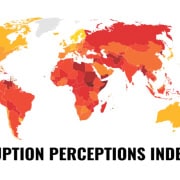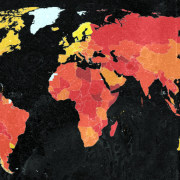|
Getting your Trinity Audio player ready...
|
Corruption Watch (CW) celebrated its 11th year of existence in January this year. Since it opened its doors on 26 January 2012, the organisation has maintained its determination to hold the corrupt to account, support whistle-blowers, advocate for meaningful change in relevant legislation and government processes, and educate and empower ordinary people to resist everyday corruption.
However, CW is also an important part of a wider organisation, and one which helps to expand its scope of influence in the Southern African region and further abroad – Transparency International (TI), which last week marked its 30th anniversary.
CW was admitted as a TI chapter after a four-year accreditation process – lengthy but transparent – which began in 2012 and concluded in 2016. We started off as a national contact, progressed to a national chapter in formation, and finally gained fully accredited national chapter status once we met the required standards. Full chapters undergo a review process every three years, aimed at strengthening their work and ensuring continuous compliance with TI’s standards.
“Corruption Watch draws significant strength from being part of an international anti-corruption movement,” says executive director Karam Singh. “The affiliation allows us to tap into expertise and common experience in other parts of the world drawing lesson the best ways to calibrate our advocacy, public education, research and law reform to counter corruption.”
As TI’s official representative in South Africa, CW is one of 25 national chapters on the African continent. TI believes corruption takes different forms in different countries, and organisations within those countries are best placed to tackle it. Most chapters, therefore, are independent organisations, fighting the various forms of corruption in their own countries while contributing to the global fight through their affiliation to and work with TI.
“The chapters play a crucial role in shaping our collective work and realising our regional and global goals … Transparency International’s multi-country research and advocacy initiatives are driven by the chapters,” says TI.
CW’s work in the global TI movement includes preparing information for the Corruption Perceptions Index – arguably TI’s flagship project, helping to co-ordinate local work around the Global Corruption Barometer, and participating in global events such as the International Anti-Corruption Conference, which is organised by TI.
Since 2017, we have been a part of TI’s global mining project – the Accountable Mining Programme – along with more than 20 mineral-rich jurisdictions. We are also the South African lead on the European Union Rallying Efforts to Accelerate Progress project (EU REAP), which is led by the TI Secretariat and funded by the European Commission (EuropeAid). EU REAP in South Africa aims to contribute to addressing income and wealth inequality related to land rights, land reform, and access to natural resources, by ensuring that those living in traditional areas can have a greater say over the decisions affecting their land.
We have hosted colleagues from other African chapters and travelled abroad to join meetings with them. We add our support to continent-wide and to organisation-wide open letters.
“Later this year South Africa will host a regional African meeting of TI chapters from the African continent in a robust spirit of information sharing and exchange,” adds Singh. “CW hopes that we can learn from the resilience, adaptability, and sustainability of TI as we move into our second decade of fighting corruption.”
Three decades of driving global change
Back in the 1990s, German lawyer and civil society leader Peter Eigen, a former World Bank regional director, was frustrated with the bank’s stance on not interfering with in-country corruption matters. Consequently he left the financial institution with the idea of creating a civil society organisation to fight corruption – especially that perpetrated by western countries in their developing counterparts.
In those days the idea of bribery outside borders was not the anathema that many countries consider it today. As a result Eigen met strong resistance to his vision, but with the support and co-operation of like-minded individuals and organisations, he developed the concept for what eventually became Transparency International.
The TI Secretariat was set up in Berlin, Eiger’s then home city, and it remains there to this day. He became the first chairperson of the board.
TI can take a lot of credit for the change in attitude towards bribery over borders. The organisation’s initial focus area was to counter overseas extortion by encouraging a refusal to bribe, with the recognition that multinationals were often responsible for bribing decision-makers in countries which, because of their circumstances, could not always refuse such illicit overtures.
However, soon its focus widened to tackling corruption in all its forms and by 1995 TI had published its first Corruption Perceptions Index.
“Over the past three decades, Transparency International has played a pivotal role in placing corruption at the top of the global agenda and spearheading action on all levels to tackle this pervasive issue,” said the organisation in a statement.
While it may now be common knowledge, TI helped entrench the concept that “social justice, democracy and the protection of fundamental rights go hand in hand with the fight against corruption.”
The organisation’s work has contributed significantly to the development and establishment of key international standards such as the 2003 United Nations Convention against Corruption, the 2019 European Union directive on whistle-blower protection, and the 1999 OECD Anti-Bribery Convention. It also drives the annual International Anti-Corruption Conference, which brings together global leaders, activists, young people, businesspeople, and others to “shape the anti-corruption agenda collectively”.
These are merely a few of TI’s notable achievements. The organisation is determined to continue advancing people’s rights and empowering them to resist corruption in their own spaces, thus driving its vision of “a world in which government, politics, business, civil society and people’s daily lives are free of corruption”.
It will also focus on “strengthening democratic values in the face of rising authoritarianism, protecting the vast investments aimed at tackling climate change, and using public resources to benefit everyone.”








